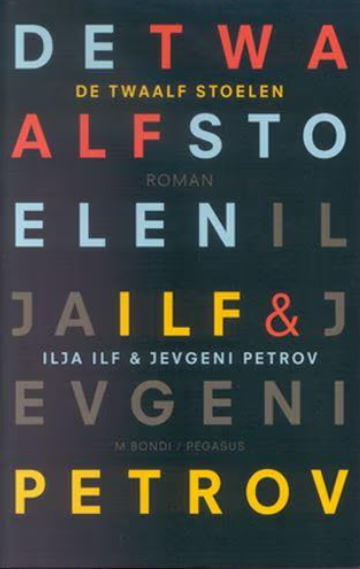On the few occasions that I’ve talked about a book, I solely discussed the merits of the author. Today, I will consider it as a Gesamtkunstwerk. My subject will be a Dutch translation published in 2004 by M Bondi/Pegasus1 of The twelve chairs, a satirical novel by two Soviet authors from Odessa. And the first complaint I have is not about the plot or the prose, but rather about Rutger Fuchs, the graphical designer, because he caved to the modern trend of cutting up words willy-nilly on the cover, rendering the title as Detwa alfsto elenil and the authors’ names as Jailf and J Evgeni Petrov.2
The plot deals with a man who learns that his mother-in-law had hidden valuable jewels in one of a set of twelve chairs, which have been confiscated by the Soviet authorities after the October revolution. He decides to go hunt for these chairs together with a conman named Ostep Bender.
Somewhere along their trip, they run out of cash. Ostep decides to try one of his cunning plans on the locals in a foresters’ town: he pretends to be a grandmaster and organises a simultaneous exhibition in the rooms of the local chess club. To convince the chess club’s dignitaries, he spins them a story featuring all the greats of the 1920’s chess scene — and this is where I complain about the translator Frans Stapert. I’m guessing he looked at the Cyrillic original and decided, correctly, that Raoul was a perfectly acceptable Dutch translation of Раул, but without considering the fact that Capablanca was an actual real life human with an actual first name in the Latin alphabet that happens to have a ‘u’ instead of a ‘ou’.
But now I also want to complain about Jailf and Petrov, because we get to the actual exhibition. Although announced as a simultaneous on no less than 160 boards, only 30 turn up. Bender apparently knows 1.e4 to be a safe first move. It is, so that’s fine. However…
By the third move it became clear the grandmaster played eighteen Ruy Lopez’s. For the remaining twelve, the black players had chosen the classic but reliable Philidor defence.
That’s not fine. I’m supposed to believe that from thirty players not a one of them played the Sicilian, or the French, or the Caro-Kann? Or the Alekhine, for God’s sake! Also, I find it very hard to believe that he manages to lose all games before the players finally understand they’ve been bamboozled. The difference between someone who, like Ostep, has played chess but once and a grandmaster is pretty noticeable.
And this is where I have to give some props to the authors. I find it very believable that he gets chased out of town and has to flee in a rickety river boat, pursued by the deceived chess players in a slightly less rickety boat. And then Bender gets lucky: they all bunch up together on one side of the boat, making it capsize. And so the chess players sink in a rather undignified fashion and the freezing water, while Bender curses them out.3
Final verdict: I don’t know. Detwa alfsto elenil is widely praised online, but the single chapter I’ve read is not terribly convincing.4 The translation in particular seems suspicious and the cover is very repulsive. So perhaps the conclusion should be: if you find a decent translation with a less off-putting cover it might be worth a shot.
1. [I’m absolutely assuming that M Bondi is the name and Pegasus the description, like Darcy esquire.] ↩
2. [That name, at least, mostly survived the graphic designer’s butchery.] ↩
3. [Strangely, he does not invite them to eat his shiny metal ass.] ↩
4. [The married chapter, though, was very persuasive!] ↩
